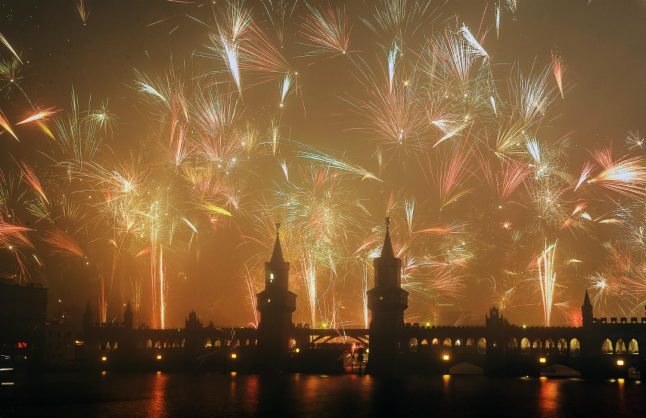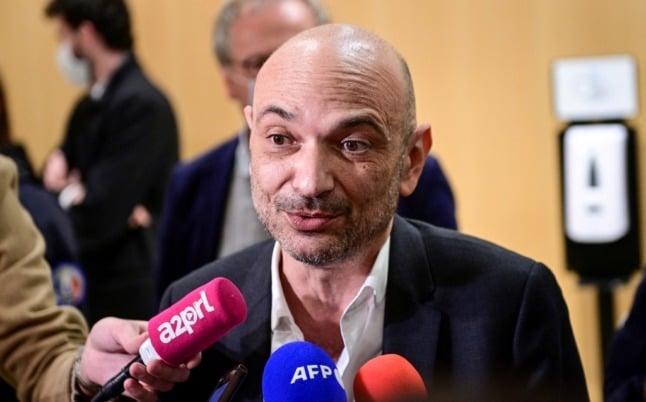Starting next Silvester – New Year’s Eve – people in the German capital will no longer be able to set off fireworks in Schöneberg, around the Pallasstraße area, and at Hermannplatz in Neukölln, German media reported on Monday.
As The Local previously reported, while German law allows the private use of fireworks only for 48 hours surrounding New Year's Eve, in Berlin firecrackers may only be used from 6 pm on New Year's Eve to 7 am on New Year’s Day.
SEE ALSO: 'What's happening on our streets can't be tolerated': Politicians float New Year's Eve fireworks ban
A ban is already in place around the area of the street called Straße des 17. Juni and Potsdamer Platz in Mitte, meaning there will be three prohibition zones in Berlin in total.
The planned crackdown is to due to unsafe “street battles” taking place in these areas, which are putting emergency service workers and members of the public at risk, reported local newspaper Tagesspiegel.
The move came as a nationwide debate on the private use of fireworks continues. Across Germany environmentalists have raised concerns about the air pollution, while others say it makes the streets unsafe.
Yet it is a long-standing tradition to welcome in the new year by letting off fireworks together and many Germans are protective of this ritual.
Attacks on emergency service staff
According to Geisel, 49 attacks on firefighters and 40 on police officers were recorded during the last New Year's Eve in the German capital. A total of 40 emergency service workers were injured. “Fortunately, none of them had to be hospitalized,” added Geisel.
In addition to the ban, extra police resources are to be put in place around the areas Alexanderplatz, Gropiusstadt, Südstern and the intersection Eberswalder-/Schönhauser Straße, which have also recently become known as ‘hotspots’.
Geisel made the announcement at the SPD parliamentary group meeting in Rostock at the weekend.
He acknowledged that the previous preventative approach had failed. After around 100 people had clashed in a street battle on New Year’s Eve 2017 in Schöneberg, police had sought to speak to those talking part, telling them of the dangers.
However, those involved continued to meet up and let off fireworks at each other.
SEE ALSO: Fireworks in Germany: What you need to know about ending the year with a bang
Complete ban not possible
The legal basis for the measure is the General Safety and Order Act. According to Section 55, orders can be issued “to avert dangers to public safety”.
However, Geisel said it wouldn’t be possible for a complete firework ban on the city. As well as being difficult to enforce, this would also require law changes at a federal level.
Geisel also rejected demands from the Greens to declare the entire area within the S-Bahn ring of the capital a firecracker prohibition zone on the basis that it would be too difficult to control and the city didn't have the resources.
Geisel said Berlin could not expect police support from other states in order to enforce this kind of ban.
Organized firework displays
SPD faction leader Raed Saleh welcomed Geisel's plans. “Dangerous fireworks at hotspots where the fire brigade and police no longer dare to go are not acceptable at all,” said Saleh.
Jörg Stroedter, deputy chairman of the SPD parliamentary group, said New Year’s Eve couldn’t continue in its current form.
Stroedter spoke out in favour of taking the long-term path of other major European cities such as Vienna or Paris, where private fireworks are banned in principle and organized firework displays by professionals are carried out instead. “This is a process that we are now pushing ahead with,” said Stroedter.
On Sunday, the SPD parliamentary group passed a resolution supporting Geisel's plans. On Thursday, the topic will be discussed in the Berlin House of Representatives.



 Please whitelist us to continue reading.
Please whitelist us to continue reading.
Member comments